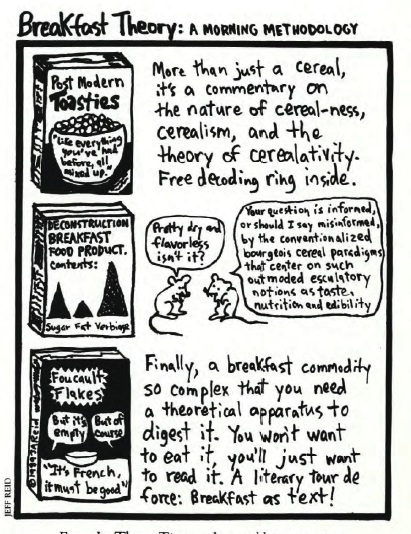By Michael Olsson
It’s fair to say that this is a question I’ve heard more than once in my career, sometimes from a student gazing in dismay at a reading list which includes Castells, Dervin and the occasional dead Frenchmen – but also on occasion, in from the occasional senior member of the profession disgruntled that my students don’t spend their every waking hour learning the Dewey Decimal System. While those asking this question usually intend it to be rhetorical, I thought I’d spend this column answering it.
Let’s start by clearing up one of the more common misconceptions: the world is not divided between airy fairy academic theorists and sensible people with common sense. Whether we’re aware of it or not, the kind of information professional we are is a product of our conceptual framework. The way we view our job, the way we interact with our clients, the decisions we make are the product of our existing beliefs, understandings and preconceptions. This personal worldview for all of us is invariably limited and contradictory so by engaging with different theories we open up the possibility of looking at the world in different ways, we can gain insights that transcend our personal experience. Systems and services are also built on assumptions, many of them so long standing that we’ve stopped noticing them. Theory provides us with alternative lenses through which to evaluate their effectiveness.
Let’s consider, for example, one of the most common assumptions in information practice. Whether we’re looking at Dublin Core or Dewey, almost all classification schemes are still based on the 19th century documentalist idea that the role of the cataloguer is to ‘capture’ the intrinsic meaning in the text. Theory can gives the tools not only to see the flaws in this assumption but also the ways in which it can lead to systems that discriminate against, even actively exclude many information users.
The work of many theorists in the second half of the 20th century, from Roland Barthes to Brenda Dervin have pointed out that meaning isn’t intrinsic to documents, nor is it determined by authors, rather it is constructed by readers. Nor, as Michel Foucault or Birger Hjorland, would point out, do we make sense of texts in a random or ad hoc way. We are each of us connected, via language, education and experience, to our own particular social context – which is how we all know without thinking about it that we should interpret Miss Moppet in a different way from On the Origin of Species or Goldfinger! Once we take these theories on-board, we can start to conceive of our professional practice in a different way: one focussed on an understanding of the conceptual framework of the individuals and communities we engage with.
So can I suggest that the next time you’re considering a spot of professional development, that the most useful thing you could do, the one that might ultimately have the greatest influence on the kind of information professional you become, might just be to spend some time with the work of a dead Frenchman or two?
First published in Incite, October 2014
Dr Michael Olsson - Graduate Coordinator, Information & Knowledge Management,University of Technology, Sydney
 |
| https://www.flickr.com/photos/askpang/3269557195/sizes/o/ |
Let’s start by clearing up one of the more common misconceptions: the world is not divided between airy fairy academic theorists and sensible people with common sense. Whether we’re aware of it or not, the kind of information professional we are is a product of our conceptual framework. The way we view our job, the way we interact with our clients, the decisions we make are the product of our existing beliefs, understandings and preconceptions. This personal worldview for all of us is invariably limited and contradictory so by engaging with different theories we open up the possibility of looking at the world in different ways, we can gain insights that transcend our personal experience. Systems and services are also built on assumptions, many of them so long standing that we’ve stopped noticing them. Theory provides us with alternative lenses through which to evaluate their effectiveness.
Let’s consider, for example, one of the most common assumptions in information practice. Whether we’re looking at Dublin Core or Dewey, almost all classification schemes are still based on the 19th century documentalist idea that the role of the cataloguer is to ‘capture’ the intrinsic meaning in the text. Theory can gives the tools not only to see the flaws in this assumption but also the ways in which it can lead to systems that discriminate against, even actively exclude many information users.
The work of many theorists in the second half of the 20th century, from Roland Barthes to Brenda Dervin have pointed out that meaning isn’t intrinsic to documents, nor is it determined by authors, rather it is constructed by readers. Nor, as Michel Foucault or Birger Hjorland, would point out, do we make sense of texts in a random or ad hoc way. We are each of us connected, via language, education and experience, to our own particular social context – which is how we all know without thinking about it that we should interpret Miss Moppet in a different way from On the Origin of Species or Goldfinger! Once we take these theories on-board, we can start to conceive of our professional practice in a different way: one focussed on an understanding of the conceptual framework of the individuals and communities we engage with.
So can I suggest that the next time you’re considering a spot of professional development, that the most useful thing you could do, the one that might ultimately have the greatest influence on the kind of information professional you become, might just be to spend some time with the work of a dead Frenchman or two?
First published in Incite, October 2014
Dr Michael Olsson - Graduate Coordinator, Information & Knowledge Management,University of Technology, Sydney


No comments:
Post a Comment